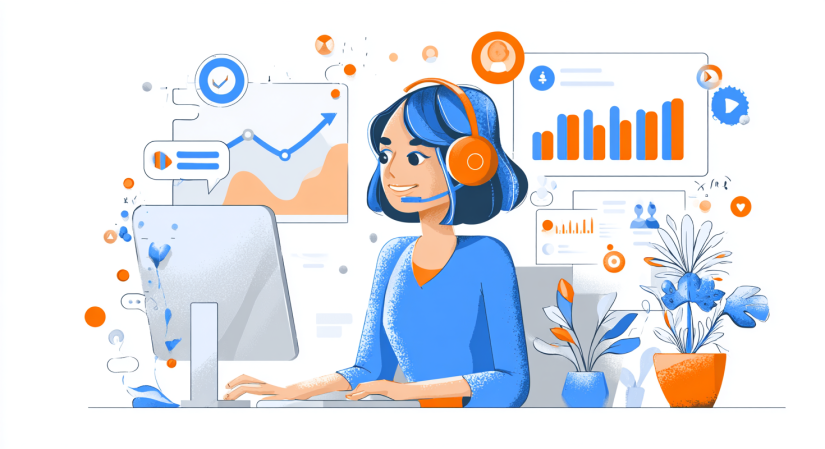Call centers seek efficiency, yet many companies need help with bloated, overcomplicated systems. End-to-end solutions promise simplicity by integrating all business processes into a single system.
However, these comprehensive systems often fall short, becoming cumbersome and inflexible, leaving businesses stuck with tools that don’t fully meet their needs.

Specialized solutions address this challenge by offering targeted, high-performance tools for specific tasks. These niche solutions provide the flexibility and precision that broad systems often lack, enabling businesses to tailor their technology to their exact needs.
In this blog, we'll delve into why specialized solutions frequently outperform end-to-end systems and how they can better transform the results of your business operations.
Stay tuned to uncover why specialization might be superior for addressing your business's unique challenges.
See how specialized solutions can revolutionize your call center. Book a free demo!
Understanding End-to-End Solutions
End-to-end solutions are comprehensive systems designed to manage all aspects of a business process from start to finish within a single, integrated framework.
These solutions cover everything from the initial customer contact to the final delivery and follow-up, providing a seamless workflow that integrates multiple functions and processes under one umbrella.
The primary goal of end-to-end solutions is to streamline operations, reduce complexity, and improve overall efficiency by eliminating the need for multiple disparate tools and systems.
Benefits of an End-to-End Solution

End-to-end solutions integrate various business processes into a single, cohesive system. This approach offers several advantages:
- Operational Efficiency: End-to-end solutions can significantly enhance operational efficiency by integrating various business processes into one unified system. This integration reduces redundancy and minimizes the need for manual data entry, leading to fewer errors and faster workflows.
- Savings: By consolidating multiple software needs into a single platform, businesses can reduce licensing fees, IT support costs and administrative overhead. A single vendor means fewer contracts to manage, simplifying vendor relationships and reducing IT management's complexity.
- Ease of Use and Training: A unified system simplifies employee training and onboarding. Instead of learning multiple systems, staff only need to become proficient in one platform, which can reduce training time and accelerate the adoption of new technologies.
- Unified Data Management: With all business processes handled within one system, data consistency and integrity are easier to maintain. This centralization supports better decision-making and reporting, as data from different departments is automatically synchronized and accessible in real time.
End-to-end solutions offer a streamlined approach to managing business operations, promising simplicity and efficiency.
However, they have limitations, which will be explored in the following sections.
Limitations of End-to-End Solutions

Despite their advantages, end-to-end solutions have notable limitations:
- Lack of Flexibility: These solutions are often rigid and can force businesses to adapt their processes to fit the software rather than vice versa.
- Overgeneralization: End-to-end systems aim to cover all bases but may lack depth in specific functions, leading to subpar performance in specialized tasks.
- Integration Challenges: While these systems aim to be comprehensive, integrating them with other specialized tools can be difficult and may require significant customization.
- High Initial Costs: Implementing an end-to-end solution can be expensive and time-consuming, requiring a significant upfront investment in both money and resources.
The Rise of Specialized Solutions
As the business landscape evolves, the limitations of end-to-end solutions have driven many companies to seek more flexible and precise alternatives, leading to the rise of specialized solutions.
These tools are designed to excel in specific areas, offering deep functionality tailored to meet particular needs. They provide a level of customization and performance that broad systems often lack.
Specialized call center solutions cater to niche markets, addressing unique challenges across various industries, such as CRM with Salesforce and HubSpot, design with Adobe Creative Cloud, HR with Culture Amp, accounting with QuickBooks, and project management with Trello and Asana.
This approach allows businesses to implement the best tools for each task, creating a more efficient and effective technology stack.
The trend towards specialized solutions reflects a broader shift towards agility and precision over the simplicity and uniformity promised by end-to-end systems. These solutions enable businesses to leverage best-in-class features and continuously innovate within their domains.
This blog is just the start.
Unlock the power of Convin’s AI with a live demo.

Specialized Solutions Vs. End-to-End Solutions: A Comparison

If you want to have a better understanding of specialized solutions, check out some real-world examples in the next section.
Real-World Examples of Specialized Solutions
The shift towards specialized solutions is evident across various industries, where tailored tools provide significant advantages over-generalized systems.
Here are some real-world examples highlighting the effectiveness of specialized solutions:
1. Customer Relationship Management (CRM)
Salesforce and HubSpot are prime examples of specialized CRM tools. Salesforce offers a customizable platform that enables businesses to manage customer interactions, sales pipelines, and marketing campaigns with advanced features such as AI-driven analytics and automation.
HubSpot provides a user-friendly interface with robust inbound marketing capabilities, allowing companies to attract, engage, and delight customers through personalized marketing efforts.
2. Design
Adobe Creative Cloud caters specifically to designers' needs, offering a comprehensive suite of tools for graphic design, video editing, web designers, and more.
Its specialized applications, like Photoshop for image editing and Premiere Pro for video production, provide advanced functionalities far surpass those of general office software, empowering creative professionals to produce high-quality work efficiently.
3. Human Resources
Culture Amp focuses on employee engagement and performance management, providing detailed analytics and insights that help businesses improve their workplace culture.
This specialized HR tool allows companies to gather employee feedback, conduct performance reviews, and implement targeted development programs, ensuring a more engaged and productive workforce.
4. Accounting
QuickBooks is designed specifically for small and medium-sized businesses. It offers robust accounting functionalities such as automated billing, expense tracking, and financial reporting.
This specialized software simplifies financial management, providing tools tailored to the unique needs of smaller enterprises, which are often overlooked by broader ERP systems.
5. Project Management
Tools like Trello and Asana excel in project management by offering features such as task assignment, progress tracking, and collaborative workspaces. Trello uses a visual board and card system to organize tasks, making it easy for teams to manage projects at a glance.
Asana provides a more detailed approach with custom workflows and project timelines, enabling teams to track progress and stay on schedule effectively. Taking a project management course can help users fully leverage these tools for maximum productivity and efficiency.
Explore specialized solutions designed for your unique needs.
Benefits of Choosing a Specialized Solution
Choosing a specialized solution over an end-to-end system can offer numerous advantages tailored to meet specific business needs. Here are some key benefits:
1. Tailored Functionality
Specialized solutions are designed to address specific tasks and challenges within a business, providing features and capabilities that align precisely with those needs. This means companies can achieve higher efficiency and effectiveness in their operations by using tools that are purpose-built for their particular requirements.
2. Enhanced Performance
Due to their focus on specific areas, specialized solutions often offer more advanced and robust features than those in generalist systems. This depth of functionality allows businesses to perform tasks with greater accuracy and speed, leading to improved overall performance.
3. Flexibility and Scalability
Specialized tools provide the flexibility to adapt to changing business needs. As businesses grow and evolve, these solutions can be scaled and customized to support new processes and requirements. This adaptability ensures that the limitations of a one-size-fits-all system do not constrain companies.
4. Continuous Innovation
Specialized solutions providers typically focus on continuous improvement and innovation within their niche. This focus means that businesses using these tools can benefit from the latest advancements and updates, ensuring they stay ahead of the competition and are equipped with cutting-edge technology.
5. Reduced Vendor Dependency
Using specialized solutions, businesses can reduce their reliance on a single vendor. This diversification minimizes risk and allows for greater flexibility in choosing and switching tools. Companies are not locked into a single ecosystem and can select the best tools for each function.
6. Customizability
Specialized call center solutions offer high levels of customization, enabling businesses to tailor the software to their needs. This customizability ensures that the tools fit seamlessly into existing workflows and processes, enhancing productivity and user satisfaction.
Road to a Specialized Solution for your Call Center
Transitioning to specialized solutions can significantly boost your call center's performance. While end-to-end solutions have benefits, specialized call center solutions provide the precision, flexibility, and advanced capabilities needed for superior performance.
Tools like those from Convin can transform your operations, leading to better results and a more agile approach to customer service. At Convin, we offer tailored tools like conversation analysis, automated coaching, and seamless integration using Gen-AI and LLM to meet call centers' unique challenges.
By adopting Convin’s specialized call center solutions, your call center can enhance efficiency, customer satisfaction, and agent performance. These tools offer deep functionality tailored to your specific needs, helping you maintain high service standards and respond effectively to customer inquiries.
Get in touch with our experts to get started with specialized solutions for your business.
Frequently Asked Questions
1. What is the end to end solution?
An end-to-end solution provides a complete system or service from start to finish, covering all necessary components and processes.
2. What is an end-to-end customer service process?
An end-to-end customer service process manages all customer interactions from the initial contact to resolution, ensuring a seamless experience.
3. What is an example of end-to-end process?
An example is an e-commerce transaction, which includes product selection, payment, order processing, shipping, and delivery.
4. What is the best software for call centers?
The best software varies, but popular options include Convin.ai, Five9, Genesys, and Talkdesk, depending on specific needs and features.
5. What is the AI solution for call center?
AI solutions for call centers include chatbots, virtual assistants, and automated call routing systems that enhance efficiency and customer service.
6. What software do call center agents use?
Call center agents typically use CRM systems like Salesforce, call management software like Five9, and communication tools like Zendesk.
7. What are the types of call center software?
Types include inbound call software, outbound call software, automated call distribution (ACD), interactive voice response (IVR), and CRM systems.




.webp)



.avif)